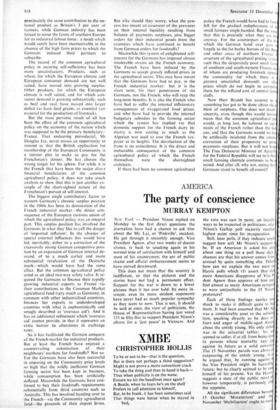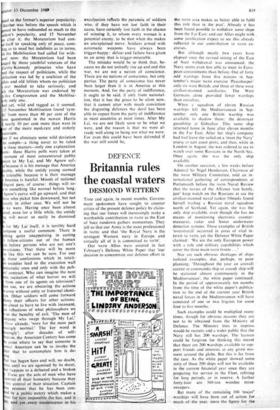AMERICA
The party of conscience
MURRAY KEMPTON
New York — President Nixon replied on Monday to the first direct questions the journalists have had a chance to ask him about the My Lai, or `Pinkville', incident. He got through it smoothly enough. Vice President Agnew, after two weeks of decent silence, is back to speaking again in his normal tone of satisfaction with himself and most of his countrymen; the arc of public shame and official embarrassment seems to have curved downward.
This does not mean that the country is indifferent, or that the pictures and the stories have not had a permanent effect. Support for the war is down to a lower plateau than it has ever held. Its more in- sistent, even its more strident opponents have never had as much popular sympathy as they seem to now. This is not, it should be said at once, the view of politicians, the House of Representatives having just voted 333 to fifty-five to support President Nixon's efforts for a 'just peace' in Vietnam. And the vote was cast in panic, an impu'.2 ways to be respected in politicians, after Nixon's Gallup poll majority reached highest point since his inauguration.
Still, later polls, if they indicate anyth suggest how soft Mr Nixon's support be. If an American is asked his attic about one thing on a poll these days chances are that his answer. comes from arousal by quite something else. Othe how can we explain the two most r Harris polls which (1) assert that slit more Americans disapprove of Vice dent Agnew than approve of him and find almost as many Americans sympat as were antipathetic to the 15 Nove protesters?
Each of these findings carries en shock to make it difficult quite to be them. It had been assumed that Mr A was a considerable asset to the admirn tion, speaking directly as he does to fears and anger of middle-aged Amen about the untidy young. His only defio was in the actuarial tables: his a' seemed to suffer, if at all, from being di to persons whose mortality rate a against its future as a solid constitu The 15 November parade was above a' outpouring of the untidy young; it be argued that, by running against the Vice President might be hazardi' future; but he clearly seemed to be a himself of his present. Yet the Harris suggests a state of the public mind however temporarily, is perilously cl the opposite.
All the significant differences betw 15 October 'Moratorium' and the November 'Mobilisation' ought to have led to the former's superior popularity. october was before the speech which is sed to have redounded so much to the
dent's popularity, and 15 November after it; the Moratorium had con= itself to speaking only of peace, com- ag as to need but indefinite as to terms, le the Mobilisation had called for with- wal now; the Moratorium had been ed by those youthful veterans of the arthy-Kennedy primaries who have ed the respect of politicians, while the bilisation was led by a coalition of the is and old leftists whom no politician ever needed to take seriously; and Ily the Moratorium was endorsed by -five Congressmen and the Mobilisa4 by only one.
nd yet, wild and ragged as it seemed, l5 November Mobilisation found `sym- y' from more than 40 per cent of the ns questioned in the newest Harris . nearly 10 -per cent more than were in ,ur of the more moderate and orderly ratorium.
w if we eliminate some wild deviation he sample—a thing never to be ruled a these matters—only one explanation sins: these Harris polls were taken at moment of most concentrated public ntion to My Lai, and Mr Agnew suf4
because it is his message that America able, while the untidy young seemed tolerable because it is their message America is hateful. Moods of national disgust pass, of course: things will re. to something like normal before longs Agnew's curve will go upward, and that ose who picket him downward, but not eeply in either case. We will not be we were. Having once been almost pted, even for a little while, the untidy ng will never so easily be dismissed for My Lai itself, it is terribly hard mpose a useful comment. There is thing quite unappetising in casting fellow-citizens out of the human es before persons who are not one's w-citizens. That there will be more es like this we can be sure. For one g. those confessions which in totali- n societies lead to the execution wall mocratic ones end only with the pub.!
contract. Who can imagine the next ess recitation of what horror we will from one of its agents on television?
n too, we are obscuring the actions n army without unity or fraternal identi, on. Other soldiers will come forward lame their officers for other actions; re about to have to live with incessant,
e reflections of what philosophers we on the banality of evil. 'The men of mpany who swept through My Lai,' Time already, 'were for the most part essingly normal.' The key word is essingly'; after decades of self-
ation, the American Century has come e point where to say that someone is rmal American can be to invoke the fier that to contemplate him is de,
at has begun here and will, no doubt, nue until we are agonised by its shout, at happens to a defeated and a broken • These gre the acts of men who have Control o their humanity because they
lost control of their situation. Captain ina protests that he has been con-
ed by a public outcry which makes a vial for him impossible (he has, and it ): and yet every reminiscence in his exculpation reflects the paranoia of soldiers who, if they have not lost faith in their cause, have certainly lost faith in the chance of winning it, to whom every woman is a potential enemy, to be shot when she makes an unexplained move. Soldiers armed with automatic weapons have always been trigger-happy: defeat and failure have given us an army that is trigger-miserable.
The mistake would be to think that, be4 cause we do not unitedly rise up and end this war, we are not a nation of conscience. There are no nations of conscience, but only parties. The party of conscience has never been larger than it is in America at this moment. And, for the party of indifference, it ought to be said, if only from national- ism, that it has the grace to be silent now, that it cannot utter with much conviction the disgusting defences the devil has been able to expect from the party of indifference in most countries at most times. After My Lai, we are not likely soon to be what we were, and the reason is that we were al- ready well along to being not what we were. For even this could have been defended if the war still could be,















































 Previous page
Previous page